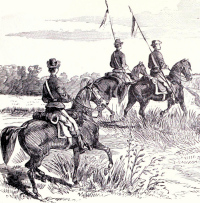THE FORCED MARCH TO SPRINGFIELD.
Bolivar, October 26th. Zagonyi’s success has roused the enthusiasm of the army. The old stagers took it coolly, but the green hands revealed their excitement by preparing for instant battle. Pistols were oiled and reloaded, and swords sharpened. We did all this a month ago, before leaving St. Louis. We then expected a battle, and went forth with the shadow and the sunshine of that expectation upon our hearts; but up to this time we have not seen a shot fired in earnest. Now the blast of war blows in our ears, and we instinctively “stiffen the sinews and summon up the blood.”
Captain H., the young chevalier of the staff, whom we have named Le Beau Capitaine, went this morning to St. Louis with intelligence of the victory. He has ninety miles to ride before midnight, to catch to-morrow’s train.
Under the influence of the excitement which prevailed, we were on horseback this morning long before it was necessary, when the General sent us word that the staff might go forward, and he would over-take us. The gay and brilliant cavalcade which marched out of Jefferson City is destroyed, –the maimed and bleeding Guard is reposing a few miles south of Bolivar,–the detachment which was left at head-quarters has gone on to join the main body,–and the staff broken into small parties, straggles along the road. A more beautiful day never delighted the earth. The atmosphere is warm, the sky cloudless, and the distance is filled with a soft dreamy haze, which veils, but does not conceal, the purple hills and golden forests.
A few miles south of our last night’s camp we came out upon a large prairie, called the Twenty-Five Mile Prairie. It is an undulating plain, seven miles wide and twenty-five long. It was the intention to concentrate the army here. A more favorable position for reviewing and manoeuvring a large force cannot be found. But the plan has been changed. We must hasten to Springfield, lest the Rebels seize the place, capture White and our wounded, and throw a cloud over Zagonyi’s brilliant victory.
Passing from the prairie, we entered a broad belt of timber, and soon reached a fine stream. We drew rein at a farm-house on the top of the river-bank, where we found a pleasant Union family. The farmer came out, and, thinking Colonel Eaton was the General, offered him two superb apples, large enough for foot-balls. He was disappointed to find his mistake, and to be compelled to withdraw the proffered gift. Sigel encamped here last night, and the debris of his camp-fires checker the hill-side and the flats along the margin of the creek. After waiting an hour, the General not coming up, Colonel Eaton and myself set out alone over a road which was crowded with Sigel’s wagons. Everything bears witness to the extraordinary energy and efficiency of that officer. This morning he started before day, and he will be in Springfield by noon to-morrow. His train is made up of materials which would drive most generals to despair. There are mule-teams, and ox-teams, and in some cases horses, mules, and oxen hitched together. There are army-wagons, box-wagons, lumber-wagons, hay-racks, buggies, carriages, –in fact, every kind of animal and every description of vehicle which could be found in the country. Most of our division-commanders would have refused to leave camp with such a train; but Sigel has made it answer his purpose, and here he is, fifty miles in advance of any other officer, tearing after Price.
We were jogging painfully over the incumbered road, and through clouds of dust, when an officer rode up in great haste, and asked for Dr. C., who was needed at the camp of the Guards. By reason of the broken order in which the staff rode to-day, he could not be found. For two mortal hours unlucky aides-de-camp dashed to the front and the rear, and scoured the country for five miles upon the flanks, visiting the farm-houses in search of the missing surgeon. At last he was found, and hurried on to the relief of the Guard. At this moment the General came up, and, to our astonishment, Zagonyi was riding beside him, bearing upon his trim person no mark of yesterday’s fatigue and danger. The Major fell behind, and rode into Bolivar with me. On the way we met Lieutenant Maythenyi of the Guard.
Our camp is on the farm of a member of the State legislature who is now serving under Price. His white cottage and well-ordered farm-buildings are surrounded by rich meadows, bearing frequent groups of noble trees; the fences are in good condition, and the whole place wears an air of thrift and prosperity which must be foreign to Missouri even in her best estate.
Fremont’s Hundred Days in Missouri was published in three installments in The Atlantic Monthly. The anonymous author appears to have been a member of Fremont’s staff with a disdainful bias towards Missourians, even those who were pro-Union.
